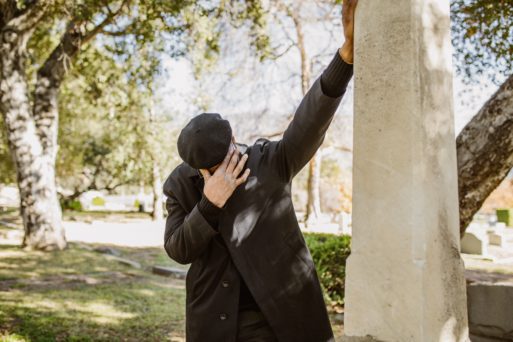
I remember a four-legged animal strolling through a fire. Poverty in a prom dress. A girl in a bed trying to tune the AM radio to the voices of the dead. A temple constructed out of cobwebs into which the responsibilities of my daily life were swept. Driving through a Stop sign waving to the woman on the corner, who looked on, horrified.
But I remember, too, the way,
loving everyone equally because each of us would die,
I walked among the crowds of them, wearing
my disguise.
And how, when it was over, I found myself
here again
with a small plastic basket on my arm, justanother impatient immortal
sighing and fidgeting in an unmoving line.
Laura Kasischke’s poem, “Memory of Grief,” starts off with evocative but almost incomprehensible images. Who knows what animal walks through fire, or what poverty in a prom dress might look like? But it’s the third sentence that seems to point us towards the poem’s meaning: a girl trying to catch the voices of the dead on her radio. From there, the images remain haunting, but in conjunction with the poem’s title, it becomes clear that the poem is a musing on the experience of grief. In the most moving line of the first stanza, Kasischke describes grief as “a temple constructed out of cobwebs into which the responsibilities of my daily life were swept.” As anyone who has been through grief knows, it can be an all-encompassing whirlwind that removes any semblance of normal routine or tasks. Instead, days run together, responsibilities abandoned. Kasischke continues by reflecting on grief as running through a stop sign while presenting a cheery face, while shocking onlookers. This line calls to mind how personal tragedy can summon shock and pity from those watching, while to grievers, it can feel like they are desperately trying to continue with life as before, but failing.
In the second stanza, Kasischke continues remembering the experience of grief, but moves beyond the chaotic nature of picking up the pieces, and instead reflects on the empathy grief gave her. She writes, “But I remember, too, the way, / loving everyone equally because each of us would die.” Grief overwhelms, but it also illuminates the fragility of life. In collective tragedies, people typically turn towards each other and want to help, united in their grief. Kasischke’s grief opens her up in new ways to loving all of humanity, aware of our mortality. She describes putting on a mask to interact with others, and then describes how grief subsided and she returned to normal life, impatient with small things once again.

Author Laura Kasischke
Credit: Poetry Foundation
Kasischke speaks to the transformative nature of grief. When loss is fresh, it can completely consume us, removing any normalcy, but it also heightens our emotional awareness and sense of connection. Emotions exist in a purer form and intensity in the aftermath of grief: sadness is overwhelming, but empathy and love can feel heightened as well. And then, eventually, the crisis subsides. We spend less time in the space of grief, and more time adjusting back to the real world and everyday annoyances. Grief is deep loss, but also can offer the gift of perspective.

 “Memory of Grief” by Laura Kasischke
“Memory of Grief” by Laura Kasischke


 Debating Medical Aid in Dying
Debating Medical Aid in Dying
 “Help Me, Helen”
“Help Me, Helen”















